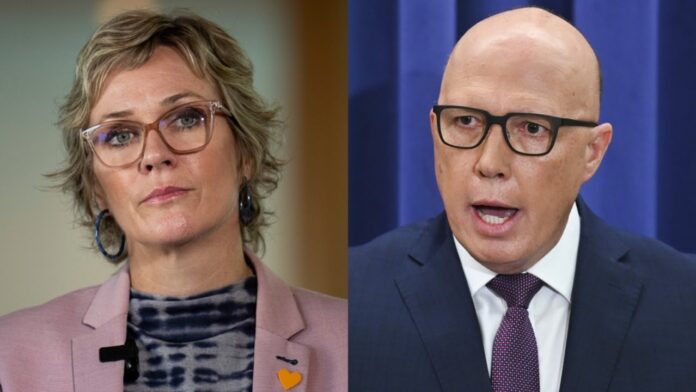Independent MP Zali Steggall labels opposition leader Peter Dutton a bully over his response to her criticism of his stance on Palestinian refugees and immigration policies
Independent MP Zali Steggall has intensified her criticism of Opposition Leader Peter Dutton, accusing him of bullying tactics after he sought legal advice in response to her parliamentary remarks. The dispute erupted last week when Steggall told Dutton to “stop being racist” during a heated session of question time. The comment, made amid a broader debate over Australia’s policy towards refugees from Gaza, has sparked a fierce political clash.
Steggall’s accusation against Dutton follows reports that he is considering legal action in response to her remarks. During an interview on ABC’s Radio National, Steggall dismissed the notion of legal threats as part of Dutton’s “playbook” to intimidate critics and suppress dissent. She insisted that her comments were necessary to address what she sees as racially motivated policies.
The conflict centres on Dutton’s recent call for Australia to reject all migrants from Gaza. The opposition leader’s stance has been criticized by Steggall and others as fostering division and fear. Steggall, who later withdrew her initial comment but maintained her criticism of Dutton’s policies, argues that they are inherently racist and designed to create hostility towards Palestinians.
The debate has extended beyond individual remarks to encompass broader issues of national policy and security. Dutton’s recent opinion piece for News Corp, in which he labelled the Labor Party, the Greens, and independent MPs like Steggall as “Hamas’ useful idiots,” has further fueled tensions. Steggall criticized this piece as an attempt to instil fear and distract from the core issues at hand.
Prime Minister Anthony Albanese has weighed in, accusing Dutton of being divisive and suggesting that if Dutton lacks confidence in Australia’s national security agencies to vet Palestinian refugees, he should publicly address those concerns. Albanese’s remarks underscore a growing rift between the government and the opposition on immigration and refugee policies.
The controversy has also elicited responses from other political figures. Coalition foreign affairs spokesman Simon Birmingham has accused both Albanese and Steggall of engaging in personal attacks rather than focusing on substantive policy discussions. Birmingham’s criticism reflects the broader political fallout from the debate, highlighting the tension between different factions within Australian politics.
As the debate continues, the focus remains on the implications of Dutton’s proposed refugee ban and the broader impact of the Gaza conflict on Australian politics. The controversy has brought issues of racism and immigration policy to the forefront of national discourse, with Steggall and Dutton’s clash emblematic of deeper divisions within the political landscape.
Analysis:
Political: The feud between Zali Steggall and Peter Dutton highlights significant political divisions within Australian politics, particularly regarding immigration and refugee policy. Steggall’s allegations of bullying and racism against Dutton reflect a broader concern about the direction of Australian policy towards refugees from Gaza. This conflict underscores the challenge of balancing national security concerns with humanitarian considerations and has the potential to influence voter perceptions in the lead-up to future elections.
Social: The public dispute between Steggall and Dutton resonates with broader social issues, including the treatment of refugees and racial discrimination. Steggall’s comments reflect growing concerns about how policies affect marginalized groups, while Dutton’s stance is seen as exacerbating societal divisions. The controversy highlights the role of political leaders in shaping public discourse around race and immigration, and the impact of their statements on social cohesion.
Racial: The accusations of racism directed at Dutton are central to this debate, revealing underlying racial tensions in Australian politics. Steggall’s criticism of Dutton’s policies as racist points to broader concerns about how immigration laws disproportionately affect minority groups. This aspect of the dispute underscores the need for more nuanced and empathetic approaches to immigration policy that consider the racial and ethnic dimensions of the issues at hand.
Gender: Gender dynamics are subtly at play in this political clash. As an independent female MP, Steggall’s position and comments challenge the traditionally male-dominated political sphere. Her role in calling out what she perceives as discriminatory policies reflects broader efforts by women in politics to address issues of social justice and equality. The gendered nature of political discourse and the reception of female politicians’ critiques often shape the public and political response to such controversies.
Economic: The economic implications of the debate over Gaza refugees and immigration policy are significant. Dutton’s proposed ban could affect Australia’s international relations and potentially influence economic agreements or aid related to the Gaza conflict. Additionally, the political and social tensions resulting from this debate could impact economic stability, as divisive policies might affect domestic and international perceptions of Australia’s approach to humanitarian issues.
